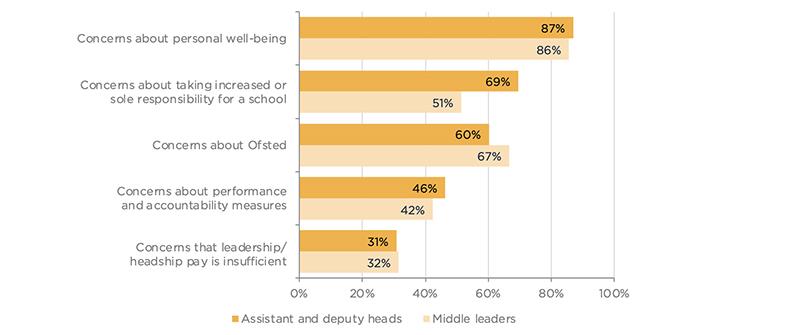A survey of 2,047 school leaders found that 53 per cent of those who were not currently a headteacher did not want to become one. This figure is up from 46 per cent in 2020 and 40 per cent in 2016.
Furthermore, the more experienced a teaching professional becomes, the less likely they are to want to take the final step to headship.
The research report has been published by the National Association of Head Teachers (NAHT, 2021). It finds that a vast majority of the respondents say their health and wellbeing has been affected by their role this year, with the most common symptom being disrupted and disturbed sleep (88 per cent of respondents).
When asked to summarise their role as leaders in 2021, the three most common responses were: exhausting, challenging, stressful.
The respondents said that keeping pace with government pandemic guidance has been the biggest driver of workload (74 per cent).
The report states: “Excessive workload has long been recognised as a driver of leadership attrition. This year, over two-thirds (70 per cent) of leaders told us that reducing leadership workload would make school leadership roles more attractive.”
Leaders in the report also slam Ofsted for its impact on their wellbeing, with 23 per cent saying that Ofsted and other external accountability pressures were a top workload driver. Worse still, 49 per cent of the school leaders said that their most recent Ofsted inspection had offered no useful insights about their schools.
The report adds: “Emerging anecdotal evidence suggests that the return of full inspections, accompanied by other accountability measures, is putting even greater pressure on leaders and their schools as they continue to struggle with the impacts of the on-going pandemic.”
On pay, the survey finds that the public sector pay freeze, which was recently lifted by chancellor Rishi Sunak, has hit morale (83 per cent).
The survey asked those aspiring to senior leadership or headship what the biggest deterrents are and found that the risk to personal wellbeing, concerns about Ofsted and concerns about taking on the increased responsibility for a school were the top three. Other concerns included performance and accountability measures and concerns over insufficient pay.

Paul Whiteman, general secretary of the NAHT, said: “School leadership supply is teetering on the brink of collapse. Fewer teachers aspire to become school leaders, and aspiration to headship has plummeted. Experienced teachers and leaders with decades of classroom and management experience do not view headship as an attractive, viable and sustainable career choice. The future leadership supply indicators are all flashing red.”
Elsewhere, the report finds that the number of school leaders who would recommend leadership has fallen from 47 per cent in 2020 to 30 per cent this year.
When asked what would improve the attractiveness of school leadership, 86 per cent said “greater recognition of school leaders as professionals”, followed by reducing workload (70 per cent), and greater professional autonomy, independence and agency (58 per cent).
Mr Whiteman continued: “Before the pandemic hit, it was clear that leadership recruitment and retention was at breaking point due to unsustainable workload and working hours, and a broken inspection and accountability system. The government’s actions over the last two years have made an already bad situation even worse, and have left many leaders feeling mistreated, distrusted and unsupported. Many are making plans to retire or leave the profession early.”
The report – entitled Fixing the leadership crisis – makes five recommendations to government including freeing up schools from “centralised diktat and control”, reforming inspection and accountability measures to “remove drivers of unnecessary workload, fear and stress”, and restoring leadership pay.
Mr Whiteman added: “Leaders don’t need more system change or government intervention, they simply need appropriate resources, sufficient autonomy and to be trusted to get on with the job they love.”
- NAHT: Fixing the leadership crisis: Time for change, December 2021: www.naht.org.uk/FixingTheLeadershipCrisis
